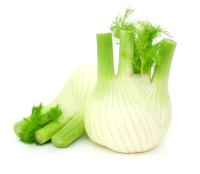Fennel
 Overview
Overview
Fennel is a perennial plant which is a hardy, umbelliferous herb. It has yellow flowers and leaves which look feathery and it grows wild in most of the more temperate areas of Europe but is considered to be indigenous to the areas surrounding the shores of the Mediterranean Sea. This herb spread to India and was found where ever Italians settled, as they enjoy using this herb in cooking.
Fennel can be found growing in many parts of the world today but it seems to prefer dry soils near seacoasts and particularly likes chalky areas.
This herb is mostly known to be cultivated for the medicinal use of its fruits (which are commonly known as seeds) in Saxony, Galicia, France, Russia, Persia and India.
History
Given the name Foeniculum by the Romans, in the Middle Ages the name became fenkel and then fennel. This herb was well known in the ancient kingdoms and was cultivated by the Romans because of its succulent shoots and its aromatic fruits. Pliny attributed 22 remedies to fennel and was known to say that serpents ate fennel when they cast away their old skins and that they sharpened their eyesight by simply rubbing on the plants.
Even in medieval times fennel was used alongside St. John’s wort and other herbs to prevent evil influences and witchcraft. It was hung over doorways on Midsummer’s Eve to ward off evil spirits.
Uses
Because of its aromatic and carminative properties, the fruit from fennel is mostly used for health-related purposes. In older times it was a common practice to boil fennel with all types of fish, and the herb was cultivated in kitchen gardens for this purpose. In today’s world, the leaves from fennel are served with salmon in order to help correct the oily indigestability of this fish. The leaves are also used in sauces, much as parsley is used. A pound of oil is the typical yield for 500 pounds of the seeds.
Fennel is one of the ingredients in the well-known compound called Liquorice Powder. Fennel water contains properties which are similar to those of dill and anise water. When mixed with sodium bicarbonate and syrup, these various waters constitute the common “Gripe Water” which is used to dispel flatulence in infants. Volatile oil of fennel also has many of these properties in a concentrated form.
Cooking Tips
Tea made from fennel is composed of half a pint of boiling water poured over a teaspoonful of bruised fennel seeds. Syrup can be prepared from fennel juice and was a common form of medicine used for chronic coughs.
Fennel is also used as a condiment for cuts of beef.
Because fennel is one of a variety of plants which is disliked by fleas, powdered fennel has the effect of driving away these insects from stables and kennels. The plant also gives off ozone very readily.
In Italy and France, the leaves of fennel plants are frequently used for garnishes and to flavor salads. The leaves are also chopped and added to sauces and puddings. Roman bakers are known to put the herb under their loaves while they are baking in order to add a pleasant flavor to the bread.
Italian soup makers use the tender stems of the fennel plant in their creations, but the stems can also be eaten raw as a salad. In John Evelyn’s book Acetaria dated 1680, he claims eating the peeled stalks of fennel served as an aid to good sleep.
Fennel was also known as a good source of nourishment when fasting.
Fennel will thrive almost anywhere and a healthy planting of it will last for years. It is easily propogated by the use of seeds, which should be sown early in April in any normal planting soil. Fennel likes plenty of sunshine but does not need heavily fertilized ground to grow in.
Dosage
Fennel can be used in cooking as a fluid extract of 5 to 30 drops, or 1 to 5 drops if using fennel oil.
Adverse Reactions
Most people have extremely healthy and beneficial reactions from consuming fennel.
References
- Bratman, S. The Alternative Medicine Ratings Guide: an expert panel rates the best treatments for over 80 conditions, Prima Health A Division of Prima Publishing (1998)
- Brown, L. Alternative Medicine, NTC/Contemporary Publishing (1999)
- Deepak Chopra, M.D. Alternative Medicine: The Definitive Guide, Celestial Arts (2002)
- Duke, J. The Green Pharmacy: Herbal remedies for common diseases and conditions from the world's foremost authority on healing herbs,Rodale Limited (2003)
- Nancy Allison. The Illustrated Encyclopedia of Body-Mind Disciplines, The Rosen Publishing Group (1999)
- Servan-Schreiber, D. The Encyclopedia of New Medicine: Conventional & Alternative Medicine For All Ages, Rodale International Limited (2006)
Posted in Fennel
Ask a Question Or Join a Discussion


